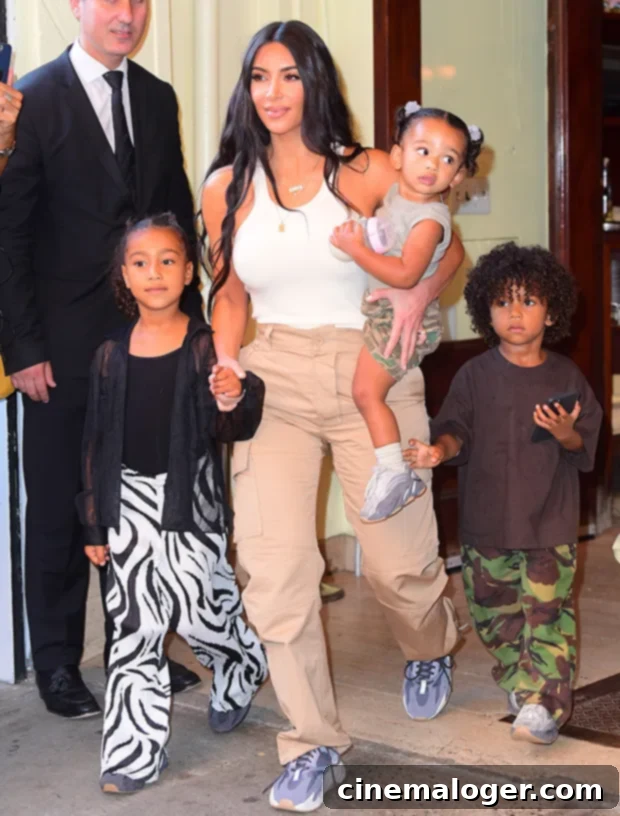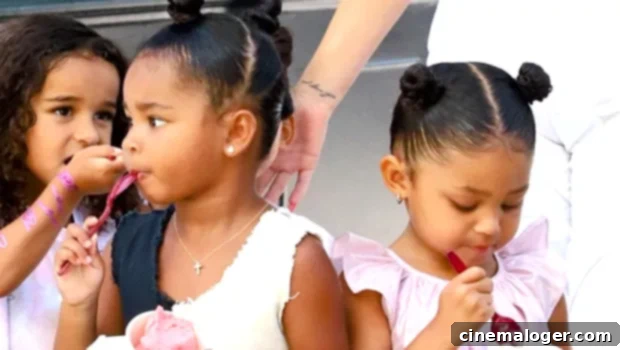Kim Kardashian’s Disneyland Photoshop Confession: Unpacking the True-Stormi Swap and The Quest for Instagram Aesthetics
The digital world has been abuzz, and the mystery has finally been unraveled! Kim Kardashian, the reality television star and business mogul, has candidly addressed the widespread Photoshop scandal that had fans and media outlets speculating for weeks. The controversy centered around a seemingly innocent Disneyland photograph taken in 2021, featuring Kim’s daughter, Chicago West. Sharp-eyed fans had questioned whether True Thompson’s face had been digitally superimposed onto Stormi Webster’s body in the picture. The internet detectives were on the case, and their persistence paid off.
The initial hint that something was amiss came on April 13, when Khloe Kardashian, True’s mother, appeared to admit to the digital alteration. This admission, though subtle, ignited further discussion and demand for a full explanation. Now, approximately two weeks after Khloe’s intriguing social media activity, Kim herself has stepped forward to provide the complete story behind the hilarious and widely discussed social media faux pas. Her reasoning? It all came down to maintaining her meticulously curated Instagram “aesthetic.” This revelation sheds light on the intense pressure celebrities face to maintain a specific public image and online persona, even at the cost of slight digital deception.
The Kardashian-Jenner family is no stranger to public scrutiny, especially regarding their social media presence. Every post, every picture, is analyzed by millions, and any deviation from perceived reality quickly becomes a trending topic. This particular incident, while seemingly minor, captivated audiences because it involved the manipulation of children’s images and highlighted the lengths to which even the most famous personalities might go to uphold their brand’s visual consistency online.
View this post on InstagramA post shared by Kardashian Social (@kardashiansocial)
Kim’s Candid Confession: The Power of an Instagram Aesthetic
Speaking out on Instagram, the 41-year-old entrepreneur and reality TV icon delved into the specifics of the situation. “OK sooooo you know I am all about my aesthetic!” Kim began her explanation, highlighting her dedication to maintaining a visually cohesive social media feed. “And my IG grid is pink and blue lately. Isn’t it so cute and well planned out!” This statement immediately sets the stage for understanding her motivation. For many celebrities and influencers, an Instagram “aesthetic” is not merely a preference; it’s a crucial component of their personal brand, influencing everything from engagement rates to endorsement deals.
Kim continued, clarifying the origin of the now-infamous picture. “The original pics were Stormi!” she confirmed, referring to Kylie Jenner’s daughter. However, a significant hurdle emerged: “I asked @kyliejenner if I could post them and she said she wasn’t really feeling posting at the moment and so I respect that!” This reveals an interesting dynamic within the famous family, where individual members retain control over their children’s public image and social media exposure. Respecting Kylie’s wishes, Kim found herself in a predicament. The picture itself, featuring Chicago in a pink outfit, perfectly complemented Kim’s meticulously planned “pink and blue” Instagram grid. This was a critical factor for Kim, who emphasized, “But it wasn’t going to mess up my IG feed. Chi was wearing pink and it matched perfectly.”
The decision to digitally alter the photo, therefore, stemmed from a confluence of factors: Kylie’s desire for privacy regarding Stormi’s image at that specific time, and Kim’s unwavering commitment to her social media brand’s visual integrity. The subtle humor in her confession also highlights the unique challenges of celebrity life in the digital age, where even minor details can become major news.
Kim further elaborated on her commitment to her aesthetic, stating that she fully owns the fact that the original images, despite being lovely, didn’t quite fit her exacting “aesthetic” standards. As fans are well aware, “how much a good aesthetic means to my soul,” is a sentiment she openly shares. With a touch of characteristic Kardashian humor and self-awareness, she jokingly added, “I will be damned if Kylie will ruin that for me and mess up my IG grid.” This lighthearted remark resonated with many, providing a relatable glimpse into the sometimes-absurd pressures of maintaining an online presence. Her final comment on this particular issue was a playful acknowledgment of the situation: “So thank you True for taking one for the team!”

The Disneyland “First Time” Controversy and Public Scrutiny
The entire scandal gained significant traction when it intersected with another family event. Kim was alluding to her sister Khloe Kardashian’s earlier statements. Khloe had initially addressed the budding controversy after she shared joyous videos from Disneyland on April 12, celebrating True’s 4th birthday. During these posts, Khloe explicitly mentioned that it was her daughter’s “first time” at the iconic theme park. This statement immediately raised red flags for vigilant “Twitter detectives” and ardent Kardashian fans. They were quick to remember and unearth the 2021 photo featuring Chicago and, allegedly, True at the very same amusement park, directly contradicting Khloe’s “first time” claim.
The contradiction instantly fueled a social media firestorm, with users expressing bewilderment and amusement. Khloe, known for her candidness, responded to the online uproar with a touch of self-deprecating humor. In a tweet, accompanied by laughing emojis, she wrote, “Welllppp I f*cked this one up. Anyways….. let’s focus on something else. Our show airs in a few days.” This response, while acknowledging the mistake, also served as a clever pivot to promote their upcoming Hulu series, “The Kardashians,” demonstrating the family’s savvy in managing public relations even amidst minor controversies.
The public’s intense reaction to this seemingly small detail underscores a broader trend: the increasing demand for authenticity from public figures in the age of social media. When celebrities present carefully curated images, any hint of digital manipulation or factual inconsistencies can quickly erode trust and generate significant backlash. This incident became a case study in how interconnected social media narratives are and how difficult it is for public figures to maintain perfectly consistent portrayals across various platforms and timelines.
Beyond Disneyland: Kim’s Ongoing Battle with Photoshop Allegations
Kim’s confession about the Disneyland photo arrived just a day after she found herself embroiled in yet another controversy involving photo editing. This time, the accusations were directed at her personal body image and her highly successful shapewear brand, SKIMS. Fans speculated that Kim had Photoshopped her belly button out of promotional pictures for her SKIMS line. The detail, or rather the lack thereof, quickly became a trending topic, with critics accusing her of promoting unrealistic body standards and digitally altering her physique.
Kim, never one to shy away from addressing public criticism directly, swiftly fired back at these claims. Taking to her Instagram Story, she expressed her frustration, writing, “Come on guys… seriously! This is so dumb! Claiming I photoshopped out my belly button?” Her response highlighted the constant pressure and intense scrutiny celebrities face regarding their appearance, where even minor details can become subjects of widespread debate and accusations of digital enhancement.
These two recent Photoshop controversies involving Kim Kardashian — the Disneyland face swap and the alleged belly button removal — collectively paint a picture of the complex relationship between celebrities, digital imagery, and public perception. In an era where photo editing tools are easily accessible and social media platforms demand polished visuals, the line between enhancement and deception has become increasingly blurred. Celebrities like Kim Kardashian are at the forefront of this digital dilemma, constantly navigating the expectations of their audiences, the demands of their personal brands, and the ever-present eye of the internet’s “detectives.”
The Impact of Digital Alterations on Celebrity Culture and Authenticity
The incidents involving Kim, True, Stormi, and the SKIMS campaign are more than just celebrity gossip; they are symptomatic of larger trends in popular culture and the digital landscape. The quest for the perfect “aesthetic” on social media has become paramount for many, and for global icons like Kim Kardashian, it’s a fundamental part of her brand and income. This pressure to maintain an idealized online persona often leads to digital alterations, which, when exposed, can spark debates about authenticity, body image, and the ethics of celebrity marketing.
The scrutiny of celebrity images is at an all-time high, driven by a media-savvy public that has learned to spot even the most subtle Photoshop errors. This constant surveillance acts as both a check on potential misrepresentation and a source of perpetual pressure for public figures. The Disneyland scandal, in particular, raised questions about the ethics of altering images of children, even with seemingly innocuous intentions like maintaining an Instagram grid’s color scheme. While Kim’s explanation was lighthearted, it highlighted the extent to which celebrity images are constructed and managed, sometimes far from spontaneous reality.
Ultimately, these episodes serve as a reminder of the curated nature of celebrity life on social media. While Kim Kardashian’s transparency regarding the Disneyland incident might lend a touch of relatability and humor to the situation, it also underscores the ongoing challenges of maintaining genuine connection with an audience while simultaneously upholding an impeccable, often digitally enhanced, public image. The conversation around celebrity Photoshop will undoubtedly continue to evolve, reflecting society’s changing views on digital authenticity and the impact of filtered realities on our perceptions.
